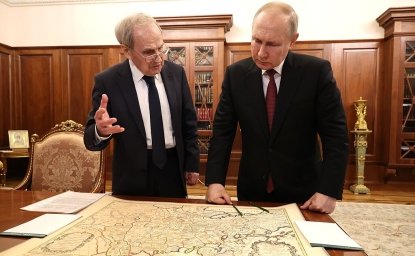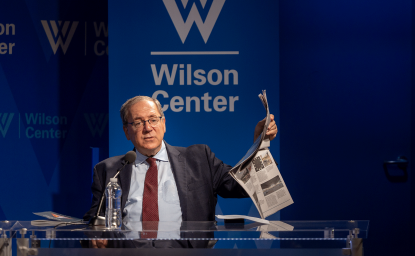East Germans Pressured Soviets to Build Berlin Wall

"The East Germans had much more power over the Soviets than was previously understood in the Berlin Crisis and the building of the Wall," remarked Hope Harrison, Assistant Professor, Department of Government and Law, Lafayette College, and Title VIII-Supported Research Scholar, Kennan Institute at a Kennan Institute lecture on 4 December 1998. Harrison was supported by discussant David Murphy, former CIA Station Chief, Berlin, 1954-61, who agreed that the "East German tail wagged the Soviet dog" in the months leading up to the construction of the Wall. (Note: Harrison was recently a featured guest on the Center's Dialogue radio program.)
Contrary to the previous view of the cold war, Harrison argued, the East Germans did exert various forms of power over the Soviets. Khrushchev was deeply committed to the triumph of socialism over capitalism in Germany, remarking that, if socialism did not win in East Germany, then the Soviets would not win. The East Germans learned from this that they could parlay the weakness of their regime into strength in bargaining with the Soviets.
East German motivation to solve the problem of their citizens fleeing to capitalist West Berlin and West Germany and their willingness and capability to act unilaterally were very important in the crisis.
Another source of East German influence was their non-implementation of Soviet policies--in particular, "socialism with a more human face." Finally, the Berlin crisis occurred at the same time as the rift between the Chinese and the Soviets which the East Germans learned to use to their advantage, using the "China card" to put pressure on the Soviets.
How did the crisis begin which ultimately led to the building of the Berlin Wall? Harrison described Khrushchev's November 1958 ultimatum to the Western powers which set a six month deadline and demanded the signing of a peace treaty (still not concluded since World War II ended), either with a united Germany or with the two existing Germanies, and that West Berlin be transformed into a demilitarized free city. If these demands were not met, the Soviets would sign a separate peace treaty with East Germany and turn over control over the access routes between West Germany and West Berlin to East Germany.
Khrushchev believed the "free city" idea was a way to solve East Germany's refugee problem. If West Berlin was a neutral city and less capitalist, then East Germans would not be so eager to migrate there. East German leader, Walter Ulbricht's solution to the problem was to either take over West Berlin or close the border. Initially, Khrushchev refused to allow the East Germans to close the border in Berlin because he felt it would exacerbate the tensions of the cold war and make communism look bad.
Ulbricht blamed the Soviets for the refugee problem and East Germany's economic problems. In January 1961, he wrote to Khrushchev blaming Soviet post-war reparations policy for the current East German crisis. He pointed out how much the Soviets took out of East Germany in the nine years after World War II when the U.S. was investing, largely through Marshall Plan aid, in West Germany.
Pressure from the East Germans to close the border continued in the spring and summer of 1961. Soviet communications from East Germany to Moscow increasingly stressed Ulbricht's desire to establish control over the border, close "the door to the West," and reduce the problem of East German citizens fleeing to West Berlin. At a Warsaw Pact meeting in March 1961, Ulbricht asked for permission from Khrushchev to close the border and was told to wait until the June 1961 meeting in Vienna with President Kennedy. After the meeting, Khrushchev--dissatisfied with the talks--agreed to close the border.
What did the Berlin Wall accomplish for Khrushchev? It saved the East German regime, eased economic pressure on the Soviet Union and other socialist countries to help East Germany, and kept Ulbricht's power limited to East Berlin, thereby taking some control away from him, Harrison argued. Finally, Khrushchev hoped the Wall would show the Chinese and others that he could stand up to the "paper tiger" West. Even after the Wall, however, Khrushchev was afraid of Ulbricht's unilateral behavior continuing. He wrote to him in September 1961 arguing that actions which could exacerbate the situation in Berlin should be avoided.
Harrison discussed what lessons could be learned from this. Soviet caution in building the wall on East Berlin territory and starting gradually with barbed wire is important. Only after it was evident the West would not resist were concrete bricks used. The most important lesson, according to Harrison, was the importance of alliance politics and the interaction between adversaries during the cold war. It is not enough to look only at U.S.-Soviet relations to understand this and other important periods of the cold war. A final lesson was the crucial role of economics in the cold war. A month after the construction of the Wall, Ulbricht wrote to Khrushchev that, "the experiences of the past years have proven that it is not possible that a socialist country such as the GDR can carry out a peaceful competition with an imperialist country such as West Germany with open borders."
Author

Kennan Institute
The Kennan Institute is the premier US center for advanced research on Eurasia and the oldest and largest regional program at the Woodrow Wilson International Center for Scholars. The Kennan Institute is committed to improving American understanding of Russia, Ukraine, Central Asia, the South Caucasus, and the surrounding region though research and exchange. Read more

Explore More
Browse Insights & Analysis
Dr. Karina Korostelina: From Crimea to Global Peacemaking


